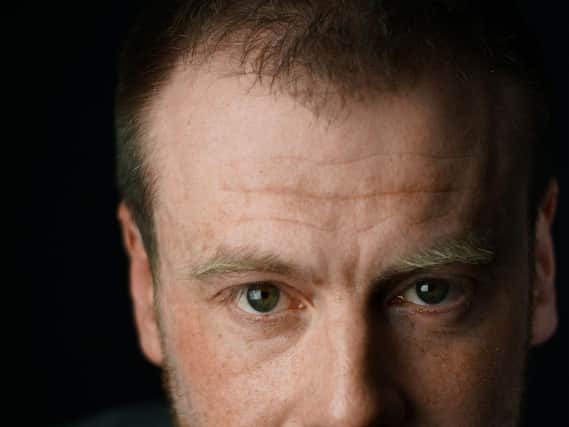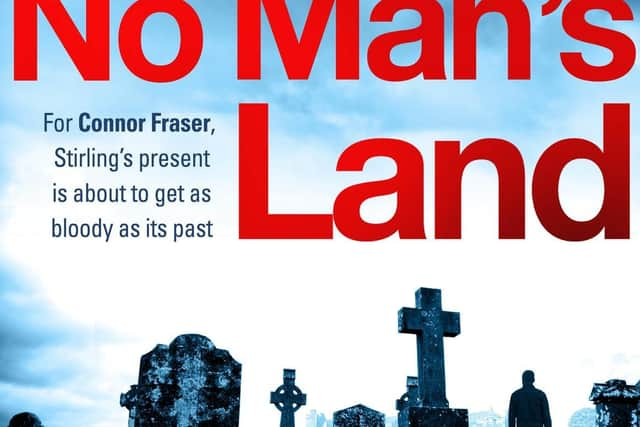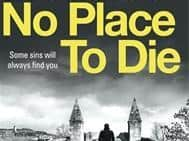Meet Dunfermline author Neil Broadfoot, the man tipped to be Scotland's new king of crime novels


LOCAL author Neil Broadfoot has been described as having ‘one hand on Ian Rankin’s crown as the king of Scottish crime’, while Rankin himself has called him ‘a true rising star of crime fiction’, adding that Broadfoot should be ‘better known and more widely read’. Both are accolades the 44-year-old acknowledges with self-depreciation.
It feels “utterly surreal,” he admits, adding, “I’ve been an admirer of Ian’s work and a fan for years, so to have the King of Crime say nice things about my work and telling other people to read it is the ultimate accolade. But it’s also illustrative of something I’ve noticed since being published - crime writers are the nicest, most supportive bunch of people you could hope to meet. Everyone busts a gut to try and help everyone else, whether that be in research or getting the word out on the books. And when this is all over, I owe Ian a pint or four in The Ox.”
Advertisement
Hide AdAdvertisement
Hide AdIt was Neil’s latest novel, No Place To Die, published earlier this month in paperback by Constable, that led Rankin to tweet his praise. The book is the second to feature Connor Fraser, a close protection specialist, who made his debut in the 2018 novel No Man’s Land - the early chapters of which are serialised on the Evening News web site.


Like No Man’s Land, No Place To Die is set in Stirling, something Neil describes as a “happy accident.”
He explains, “Like most of the developments in my writing career, the choice of Stirling was a happy coincidence. I was in the city for the annual crime writing festival, Bloody Scotland. An annual event at the festival is a football match between English and Scottish crime writers.
“I was up at the bowling green at Cowane’s Hospital where the match is held and, while watching it, me being me I suddenly thought that it would be a great place to dump a body. So I took that idea and went for a wander around Stirling with it and, as with all the best ideas, it took root and grew.”
Advertisement
Hide AdAdvertisement
Hide AdRealising Stirling had never been the location for a major crime series before, Neil let the story lead him where it wanted. “A couple of months and 100,000 words later, I had No Man’s Land and Connor Fraser,” he says.


Readers were introduced to Fraser as he got caught up in the investigation of a mutilated body found dumped at the afore-mentioned Cowane’s Hospital. It’s thrilling stuff. When a bloodied and broken corpse is then found in the shadow of the Wallace Monument with a message Fraser has received before during his time as a police officer in Belfast, the bodyguard finds he must confront his past to unravel a mystery some would sacrifice anything to protect. Having got to know the regular characters who people Fraser’s world in the first book, Neil reflects it was easy to bring them back to life in No Place To Die.
“The best thing about writing a series is getting to know the characters,” he says. "As I never plot or plan the books, I’m relying on the characters to show me where I’m going. It wasn’t really difficult to bring Connor and company back to life as they never really leave me. The volume on them may get turned down a bit between books, but they’re always there in the back of my mind, pestering me to get back to them. The challenge with series characters is to keep them evolving and growing, to make sure they don’t get stuck in a rut, doing the same things over and over again.”
No Place To Die sees Fraser drafted in to provide security at a self-development weekend run by a venture capitalist turned lifestyle guru. Things very quickly go south and, as the bodies begin to pile up and Fraser finds himself in a race against time to unmask a killer who will go to any lengths to protect their secrets.
Advertisement
Hide AdAdvertisement
Hide Ad“Like most of my books, No Place To Die started with a single idea,” Neil reveals. “In this case, it was the first line of the book. I was writing something else entirely, and that line just popped into my head.”


Giving an insight into the way he works, he reflects, “I wish I could say I’m organised enough to have ‘a process’ but I’ll only ever have a scene, a line or an idea to get my going. Then I follow the story wherever it leads me, most of the time with no idea of what’s going to happen next. It’s not the most restful way of working, but I find that it keeps the story fresh and immediate. I’m rushing to tell it to myself, to find out what’s going on, and hopefully that pace and urgency finds its way into the book, giving the reader a more enjoyable experience.”
Neil discovered his love of writing while a pupil at the old Dalkeith High - “Dalkatraz as it was fondly known,” he laughs. “I had a brilliant English teacher, Mr Robertson, who nurtured my love of English and writing. From there, it was on to study journalism and communications, then off to the Dunfermline Herald and Post before moving to the Evening News and then The Scotsman.”
It was while working at the Evening News that Neil got his big break.
Advertisement
Hide AdAdvertisement
Hide Ad“I walked past the Scott Monument and thought to myself, ‘I wonder what would happen if someone landed in the middle of the Gardens after falling from the top of the monument?” he remembers.
From that thought, Neil’s 2014 debut novel, Falling Fast, evolved. Nominated for the Bloody Scotland Book of the Year award and the Dundee International Book Prize, it featured investigative journalist Doug McGregor, well they do say to write what you know about. There was “a bit” of the author himself in the character who returned in the novels The Storm and All The Devils, he admits.
“Definitely, the way I approach a story informed Doug and how he would approach the case, trying to dig out the who, what, when, where, how and, most importantly, why. We went on that journey together, both of uncovering the mystery and getting to the heart of the story at the same time.”
Falling Fast opened a lot of doors for Neil, “I’ve never really looked back,” he agrees.
Advertisement
Hide AdAdvertisement
Hide AdAs well as spending time as a journalist, Neil also ventured into the world of PR, providing media relations advice for a variety of organisations, from emergency services to government and private clients in the City. All of which has given him a unique insight with which to colour his novels.
“It’s been useful in as much as it’s given me a look at both sides of the fence when it comes to handling a story,” he offers. “I’ve seen the journalist side when you’re digging up the line, and I’ve seen the other side, where you’re being reported on and trying to spin the narrative the way you want for the best possible effect. Hopefully, that insight gives the novels an extra depth and authenticity that readers enjoy.”
Thoughtfully, he adds, “Writing is all I’ve ever wanted to do, it’s something I’ve always done. I guess, like a lot of writers, it’s how I make sense of the world, how I dig into issues and ideas and try to explore and understand them.”
No Man’s Land and No Place to Die are published by Constable, priced £8.99 each
A message from the Editor:
Advertisement
Hide AdAdvertisement
Hide AdThank you for reading this story on our website. While I have your attention, I also have an important request to make of you.
With the coronavirus lockdown having a major impact on many of our advertisers - and consequently the revenue we receive - we are more reliant than ever on you taking out a digital subscription.
Subscribe to scotsman.com and enjoy unlimited access to Scottish news and information online and on our app. With a digital subscription, you can read more than 5 articles, see fewer ads, enjoy faster load times, and get access to exclusive newsletters and content. Visit https://www.scotsman.com/subscriptions now to sign up.
Our journalism costs money and we rely on advertising, print and digital revenues to help to support them. By supporting us, we are able to support you in providing trusted, fact-checked content for this website.
Frank O'Donnell
Editorial Director